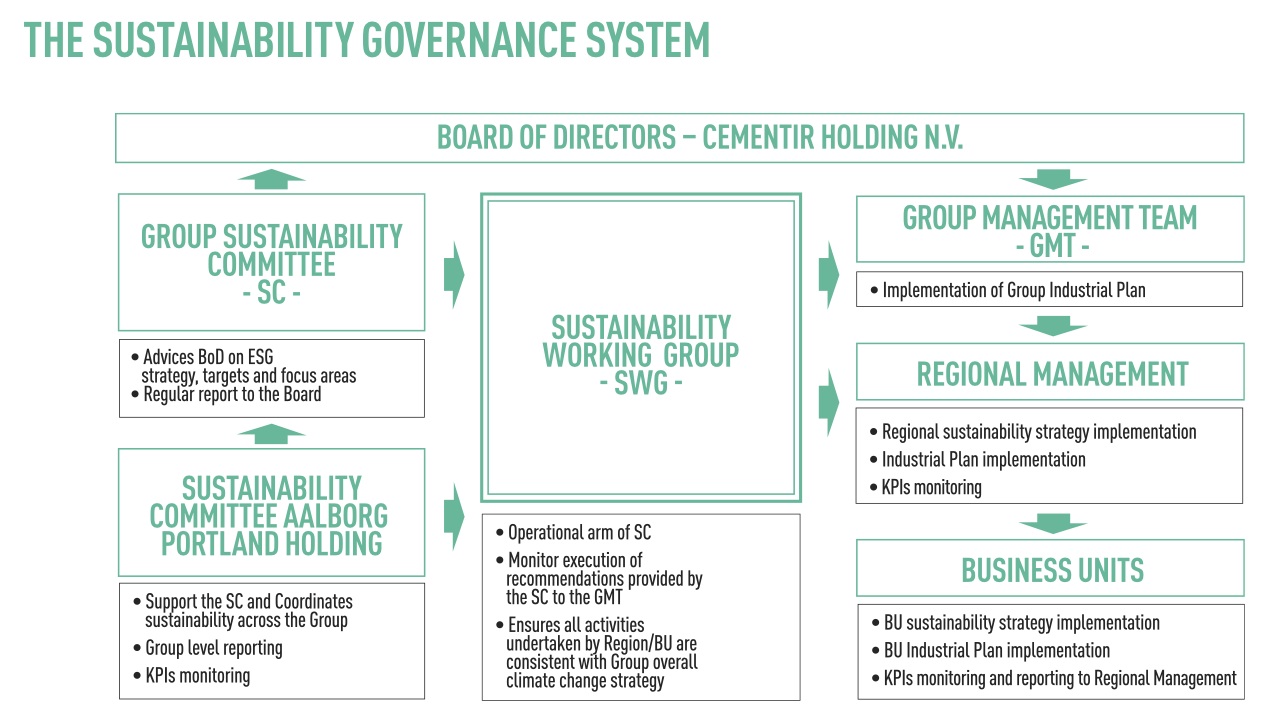Strong governance is a prerequisite for achieving our ESG goals.
We have adopted a governance structure consistent with these objectives, thanks to which it will be possible to guide the Group towards a growing level of responsibility and awareness of sustainability issues.
We have set up bodies and committees and have equipped ourselves with tools through which we are able to integrate sustainability into our business and in the relationship with all our stakeholders.
Sustainability Committee
In 2019, we set up a specific Sustainability Committee within Aalborg Portland Holding A/S, which sets the Group guidelines and commitment in the field of sustainability. This Sustainability Committee is currently chaired by the Chairman of Aalborg Portland Holding A/S.
In 2021 we appointed a Group Sustainability Committee within the Board of Directors of Cementir Holding N.V. (the Group Sustainability Committee). The Committee plays the fundamental role of assisting the BoD in formulating and implementing a sustainability strategy with a view to creating long-term value for Cementir Holding and the Group and supporting the BoD in the promotion of a healthy, safe and secure environment for stakeholders, sustainable development and social responsibility.
The Committee examines, evaluates and makes recommendations to the Board and to other Group bodies such as the Remuneration Committee regarding the sustainability objectives for the incentive of management at Group, Region and Business unit level, acts as delegated by the Board in matters of sustainability global and local, including as regards the definition, monitoring, evaluation and reporting of policies and practices, management standards, strategy, performance and governance, at global and local level. Furthermore, it regularly interfaces with the Sustainability Committee established in Aalborg Portland Holding A/S, the Sustainability Working Group (SWG) and the Group Management Team (GMT) and provides periodic reports to the Board of Directors.
The Group's management is primarily responsible for internal controls and risk management activities, assisted by the second level control functions in defining adequate risk management and control systems based on the respective levels of responsibility (e.g. EHS, Anti-corruption, Antitrust and Privacy).
The Group Sustainability Committee is made up of the Chief Executive Officer and two independent directors, with the Group General Counsel appointed as secretary. The Group Sustainability Committee is attended by group top management, ensuring the coordination and adequate implementation of the sustainability strategy within the Group.
The Group Sustainability Committee meets at least twice a year.
Sustainability Reporting
Sustainability monitoring and reporting at Group level is guaranteed by the Sustainability Reporting structure with the main objective of publishing the Sustainability Report and providing complete reporting of the Group's main parameters to the Stakeholders. The structure also represents the focal point for participation in various sustainability surveys and ratings in order to ensure continuous, timely and transparent disclosure of the objectives and related results achieved.
Ethics Committee
We have adopted a Code of Ethics which defines the principles of corporate ethics that we recognize as belonging to the whole Group and to which we require compliance by the corporate bodies, employees and all those who cooperate with Cementir Holding.
The Board of Directors has established the Ethics Committee with the responsibility of ensuring that all activities are conducted in accordance with the principles set out in the Code of Ethics. In addition, the Committee monitors reports of potential violations of the Code of Ethics, on which it receives periodic information from the Internal Audit division.
The Ethics Committee is responsible for ensuring that the activities are conducted in accordance with the principles set out in the Code of Ethics.
Commitment against corruption
The Cementir Group is active in the fight against corruption and expressly prohibits in the Code of Ethics "practices of corruption, illicit favors, collusive behavior, solicitations, direct and / or through third parties, of personal and career advantages for oneself or for others".
Since 2015 we have given impetus to the fight against corruption with the definition of a written policy that defines roles, responsibilities, operating methods and behavioral principles. It is a set of rules of conduct that all Group companies, employees and all those who act in the name and on behalf of the subsidiaries must respect in carrying out their role.
Furthermore, in 2016, a program of compliance with the regulations relating to corruption and in particular the UK Bribery Act was defined. of corruption, on a due diligence on third parties and on training and training plans. The program was implemented starting from the subsidiaries in Türkiye in 2016 and extended in 2017 to various group companies such as: Aalborg Portland Anqing (China), Aalborg Portland Malaysia (Malaysia), Sinai White Cement (Egypt) and Compagnie des Ciments Belges (Belgium and France). In 2018 the project was implemented in Aalborg Portland and Unicon (Nordic and Baltic Region).
Since 2013 we have been applying a whistleblowing system which can be used to report the violation of the principles and rules indicated in the Code of Ethics and in the policies adopted by the Group, or simply report non-compliance with laws and regulations.
The supplier code of conduct
Our customers and stakeholders are increasingly showing a growing interest in working conditions, workers' rights, the environment and the fight against corruption. For this reason, as part of our ongoing commitment to strengthen relationships with suppliers, we have decided to formalize a set of rules governing cooperation and the relationship with our suppliers to improve transparency and outline our expectations.
The Supplier Code of Conduct ensures compliance with those principles of loyalty, correctness, transparency, efficiency and orientation to the market, regardless of the importance of the supply.
